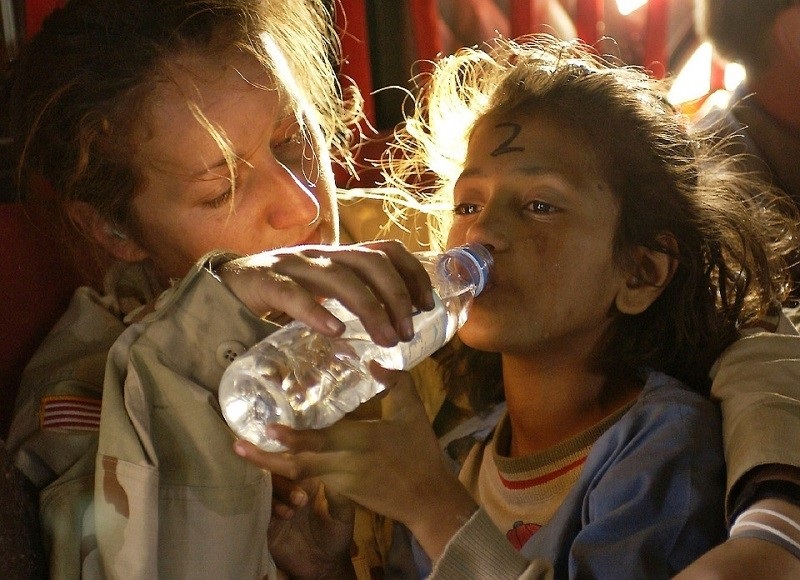Perhaps more than any other analogy, Donald Trump Jr.’s Tweet comparing refugees to poisonous Skittles captures the disturbing tendency for Syrian refugees to be discussed as though they are less-than human. Trump Jr. asked that if you were presented with a handful of Skittles, and a few would kill you, would you eat any?
Few sane people desire candy enough to risk death for it. But, as Mars Incorporated, the candy’s parent company was quick to point out, Skittles are candy – and refugees are people.
In light of such comments, how do we represent international migrants, and why does it matter?
As anti-refugee sentiments continue to grow across the West, our compassion and shared sense of humanity with Syrians seem to be dissipating. Right-wing anti-immigrant parties are surging across Europe. The Alternative for Germany party outwardly campaigns against migrants, while the Hungarian government published anti-refugee “propaganda” in preparation for their referendum on the EU’s migrant policies. Prime Minister Orbán has called asylum seekers “poison” and claimed that “every single migrant poses a public security and terror risk”. In the United States, Donald Trump has accused refugees of being “Trojan horses” for terrorists, and boasted that he would look Syrian children in the face and tell them they “can’t come” to America. He also declared that Chancellor Angela Merkel of Germany ought to be “ashamed of herself” for her tolerant and accepting policies toward migrants.
Claims that all refugees are terrorists are unfounded. We know that ISIS-related terrorism is not only waged by those of Syrian or Levantine descent. Some attacks such as those in Paris in 2015 were conducted by European-born individuals. Despite this, it was Syrian refugees who paid most heavily for the fear incited by the Paris attacks. We know that enormous numbers of Syrian refugees are women, children, and highly educated professionals. We also know that these refugees have suffered more than anyone from the crimes of ISIS.
Despite this, the negative rhetoric surrounding refugees is staggering and shameful. A 2016 Pew Global Attitudes & Trends Survey found that even in more “tolerant” countries such as Germany, the Netherlands, the UK and Sweden, more than half of survey respondents believed that most Muslims support ISIS.
Recent publications in the Washington Post make some poignant, and occasionally unpopular, comparisons between responses to Syrian refugees and responses to Jewish refugees following World War II. In a survey conducted in July 1938, 67.4% of Americans surveyed thought Jewish refugees should be kept out of the country entirely. Fewer than 5% surveyed thought immigration levels should be raised in order to accommodate more migrants.
These aren’t the stories we hear when we talk about Jewish refugees today, many of whom were fleeing Nazi Germany and concentration camps from around Europe. For many Canadians, one of the most shameful moments in our history was when a senior immigration official was quoted saying “none is too many” concerning Jewish migration. In hindsight, stories of Jewish refugees are told with compassion and empathy for the refugees and their unimaginable struggle. Although the contexts for migration are undeniably different, there is notable similarity in the hostile international response.
When the body of Alan Kurdi, a three year old Syrian refugee, was photographed drowned on a beach, public outcry was tremendous. The sadness was magnified when it was suggested that Kurdi’s parents had actually tried to come to Canada, but had been turned down. When Prime Minister Trudeau took office and began welcoming the 25,000 refugees that he promised to bring during his election campaign, the photos of our nation’s leader waiting at the airport to greet migrants were extremely humanizing. The popular Instagram account Humans of New York did a series traveling through refugee camps and telling stories of individual Syrians fleeing their homes. The stories were both incredibly emotional and incredibly eye-opening.
The dialogue and tone set by national leaders is important, but it is everyone’s responsibility to resist the de-humanizing of incoming refugees. In Hungary, a camera woman was fired for purposely tripping a Syrian refugee trying to carry his young son, and kicking several others. In the United States, refugee families have received hate mail containing phrases like “shame on you, terrorist” and “you are Muslim and not welcome”. Refugees have been physically attacked in Lebanon. In Vancouver, a group of worshipers outside a Muslim Association of Canada Centre were assaulted with pepper spray. In Germany, where an incredible 1 million refugees have been accepted, there were over 500 attacks on refugees from January to June of this year alone.
It’s harder to be hateful if you’re continually reminded that refugees have lives, have families, and have aspirations. More stories humanizing refugees and fewer stories disrespecting their very existence is an important step toward tolerance and more notable acceptance. The responsibility does not lie on Syrians fleeing civil war to convince us they’re worthy of our respect, help, and attention. The responsibility is ours to combat the de-humanizing and disregard for refugees wherever and however possible. No one should see a family trying to rebuild after escaping war, losing their home and possessions, and utter “shame on you, terrorist”.
Photo: Humanitarian aid water (2015), by Anonymous via Pixabay. Licensed under CC0.
Disclaimer: Any views or opinions expressed in articles are solely those of the authors and do not necessarily represent the views of the NATO Association of Canada.




